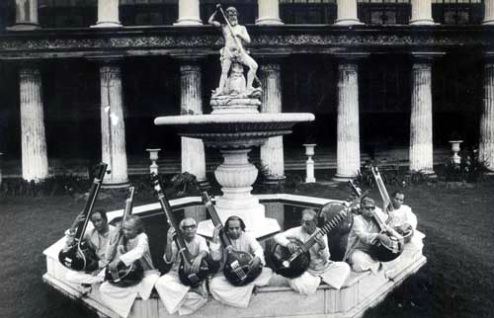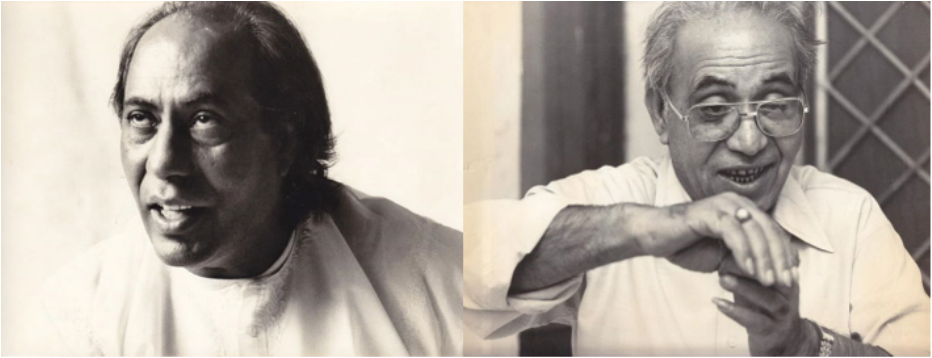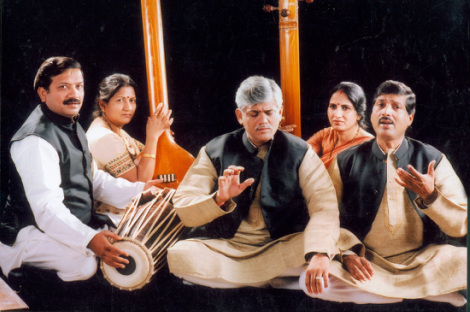DHRUPAD |
About Dhrupad

Dhrupad is the oldest surviving style of Hindustani classical music. The nature of Dhrupad music is spiritual. It induces feelings of peace and contemplation in the listener.
The word Dhrupad is deriving from Dhruva, the steadfast evening star, and Pada meaning poetry.
It is a form of devotional music, which traces its origin to the ancient text of Sam Veda.
The Sam Veda was chanted with the help of melody and rhythm, called Samgana. Gradually this developed into other vocal styles called Chanda and Prabandha with the introduction of verse and meter. The fusion of these two elements led to the emergence of Dhrupad.
By the eleventh century, Dhrupad music had crystallized into a perfect form. A significant characteristic of Dhrupad is the emphasis on maintaining the structure and purity of the Ragas and the Swaras. According to some accounts, Dhrupad was sung in the temples, the singer facing the divinity.
From this early chanting, Dhrupad evolved into a sophisticated classical form of music.
The language of Dhrupad changed from Sanskrit to Brijbhasha some time between the 12th and the 16th centuries. Around the 14th century, Dhrupad came to be patronized by the royal courts and its complex rendering became intended for highly sophisticated royal audiences. The compositions became more secular. Some where written in praise of the emperors; others elaborated on the music itself.
However, the pristine nature of Dhrupad survived and even today we hear this majestic form of music performed like it was more than 500 years ago in the royal courts of India.
To know more visit:
dhrupad.org
The word Dhrupad is deriving from Dhruva, the steadfast evening star, and Pada meaning poetry.
It is a form of devotional music, which traces its origin to the ancient text of Sam Veda.
The Sam Veda was chanted with the help of melody and rhythm, called Samgana. Gradually this developed into other vocal styles called Chanda and Prabandha with the introduction of verse and meter. The fusion of these two elements led to the emergence of Dhrupad.
By the eleventh century, Dhrupad music had crystallized into a perfect form. A significant characteristic of Dhrupad is the emphasis on maintaining the structure and purity of the Ragas and the Swaras. According to some accounts, Dhrupad was sung in the temples, the singer facing the divinity.
From this early chanting, Dhrupad evolved into a sophisticated classical form of music.
The language of Dhrupad changed from Sanskrit to Brijbhasha some time between the 12th and the 16th centuries. Around the 14th century, Dhrupad came to be patronized by the royal courts and its complex rendering became intended for highly sophisticated royal audiences. The compositions became more secular. Some where written in praise of the emperors; others elaborated on the music itself.
However, the pristine nature of Dhrupad survived and even today we hear this majestic form of music performed like it was more than 500 years ago in the royal courts of India.
To know more visit:
dhrupad.org
Ustad Zia Fariddudin Dagar & Ustad Zia Mohiuddin Dagar

Ustad Zia Fariduddin Dagar
Ustad Zia Fariduddin Dagar belongs to the illustrious family of Dhrupad musicians who are responsible for saving this ancient and noble art from disappearing. He represents the musical tradition of a family that is believed to have preserved and nurtured Dhrupad music for the last 20 unbroken generations. He was born in Udaipur, Indian, where his father Ustad Ziauddin Khan Dagar was the court musician of the Maharajah of Udaipur. He was taught Dhrupad style of vocal and instrumental (Veena and Sitar) music by his father and later by his elder brother, Late Ustad Zia Mohiuddinn Dagar, who is one of the greatest rudra veena players of our times.
Ustad is responsible to a great extent for popularizing Dhrupad music by his numerous concerts and workshops. He has traveled and performed widely in India and abroad. In recognition of his immense contribution to the classical music of India, Ustad has been bestowed with the most prestigious awards of the country like Tansen Award of M.P. Government, Sangeet Natak Academy Award.
Ustad Zia Fariduddin Dagar has a remarkable command over microtones (Swara-Bhed ) and various Gamakas, which makes his music very special. His gradual development of Alap through Vilambit, Madhya and Drut Laya adds a very interesting phenomena in his presentation of Dhrupad Music.
He passed away very recently, in May 2013.
Ustad Zia Mohiuddin Dagar
Ustad Zia Mohiuddin Dagar(1929-1990) was the world’s most renowned exponent of India’s Rudra veena , the instrumental ancestor of the Sitar. He was also one of the few masters of Dhrupad , the slow .austere, meditative traditional music still performed as it was centuries ago by Dagar forefathers in the Mughal courts. He was born on 14th march 1929, in the town of Udaipur,Rajasthan. He began his training under the tutelage of his father , Ustad Ziauddin Khan Dagar, court musician for the Maharaj of Udaipur.
He had performed all over the world and also he was affiliated with the American society of eastern arts in Berkeley, California and taught for many years at the university of Washington in Seattle and Rotterdam Music Conservatory in Holland.
In 1990 , Ustad was awarded by Kalidas Samman, one of the most prestigious award of the country , by M.P. Government. He had also received Sangeet Natak Academy Award , Rajasthan Sangeet Natak Academy award, Maharana Kumbha award and many more.
Ustad Zia Mohiuddin Dagar redesigned and innovated the traditional veena .His contribution in improving the sound of Veena is historical. He added more deeper and base sound to the playing of veena. He captured the subtle unique character of each Raga often depends on accentuating the sharp ,flat or very flat qualities of certain notes; and it was the perfect rendering of these subtleties that became a Dagar trademark. In a deliberate and unhurried fashion , he unfolded and revealed each note of the Alap movement , the slow , serene solo exposition of Raga – hypnotically, hauntingly coaxing and stretching the most delicately shaded nuances , the notes between the notes, from the thick bronze strings. Ustad Zia Mohiuddin Dagar died in 1990.
To know more visit:
dhrupad.org
Ustad Zia Fariduddin Dagar belongs to the illustrious family of Dhrupad musicians who are responsible for saving this ancient and noble art from disappearing. He represents the musical tradition of a family that is believed to have preserved and nurtured Dhrupad music for the last 20 unbroken generations. He was born in Udaipur, Indian, where his father Ustad Ziauddin Khan Dagar was the court musician of the Maharajah of Udaipur. He was taught Dhrupad style of vocal and instrumental (Veena and Sitar) music by his father and later by his elder brother, Late Ustad Zia Mohiuddinn Dagar, who is one of the greatest rudra veena players of our times.
Ustad is responsible to a great extent for popularizing Dhrupad music by his numerous concerts and workshops. He has traveled and performed widely in India and abroad. In recognition of his immense contribution to the classical music of India, Ustad has been bestowed with the most prestigious awards of the country like Tansen Award of M.P. Government, Sangeet Natak Academy Award.
Ustad Zia Fariduddin Dagar has a remarkable command over microtones (Swara-Bhed ) and various Gamakas, which makes his music very special. His gradual development of Alap through Vilambit, Madhya and Drut Laya adds a very interesting phenomena in his presentation of Dhrupad Music.
He passed away very recently, in May 2013.
Ustad Zia Mohiuddin Dagar
Ustad Zia Mohiuddin Dagar(1929-1990) was the world’s most renowned exponent of India’s Rudra veena , the instrumental ancestor of the Sitar. He was also one of the few masters of Dhrupad , the slow .austere, meditative traditional music still performed as it was centuries ago by Dagar forefathers in the Mughal courts. He was born on 14th march 1929, in the town of Udaipur,Rajasthan. He began his training under the tutelage of his father , Ustad Ziauddin Khan Dagar, court musician for the Maharaj of Udaipur.
He had performed all over the world and also he was affiliated with the American society of eastern arts in Berkeley, California and taught for many years at the university of Washington in Seattle and Rotterdam Music Conservatory in Holland.
In 1990 , Ustad was awarded by Kalidas Samman, one of the most prestigious award of the country , by M.P. Government. He had also received Sangeet Natak Academy Award , Rajasthan Sangeet Natak Academy award, Maharana Kumbha award and many more.
Ustad Zia Mohiuddin Dagar redesigned and innovated the traditional veena .His contribution in improving the sound of Veena is historical. He added more deeper and base sound to the playing of veena. He captured the subtle unique character of each Raga often depends on accentuating the sharp ,flat or very flat qualities of certain notes; and it was the perfect rendering of these subtleties that became a Dagar trademark. In a deliberate and unhurried fashion , he unfolded and revealed each note of the Alap movement , the slow , serene solo exposition of Raga – hypnotically, hauntingly coaxing and stretching the most delicately shaded nuances , the notes between the notes, from the thick bronze strings. Ustad Zia Mohiuddin Dagar died in 1990.
To know more visit:
dhrupad.org
|
|
"...any music sung from the heart,
will draw you close, will hold you like a magnet, no shortcuts or politics, there is only the soul, that needs awakening, bas..." Ustad Zia Fariddudin Dagar |
The Gundecha Brothers

Umakant and Ramakant Gundecha are one of India’s leading exponents of the Dhrupad style of music. They are the most active performers of Dhrupad in Indian and international circuits. Gundecha Brothers have played a great role to bring Dhrupad to the forefront of the concert platform. They were initiated into music by their parents, and studied Dhrupad under the internationally renowned Dhrupad maestros, vocalist Ustad Zia Fariduddin Dagar and Rudra Veena virtuoso Ustad Zia Mohiuddin Dagar, in Dhrupad Kendra Bhopal.
Akhilesh Gundecha is a percussion master of Pakhawaj who studied under Pandit Shrikant Mishra and Raja Chhatrapati Singh Judeo.
The Gundecha Brothers have recieved a number of prestigious scholarships and awards, including the national Sanskrit Award in 1994 and the Kumar Gandharva Award in 1998. As well as being an integral part of all of India’s prestigious music festivals, the Gundecha Brothers have also performed at many important international music festivals and istitutions trought the USA and Europe.
To know more visit:
dhrupad.org
Akhilesh Gundecha is a percussion master of Pakhawaj who studied under Pandit Shrikant Mishra and Raja Chhatrapati Singh Judeo.
The Gundecha Brothers have recieved a number of prestigious scholarships and awards, including the national Sanskrit Award in 1994 and the Kumar Gandharva Award in 1998. As well as being an integral part of all of India’s prestigious music festivals, the Gundecha Brothers have also performed at many important international music festivals and istitutions trought the USA and Europe.
To know more visit:
dhrupad.org

